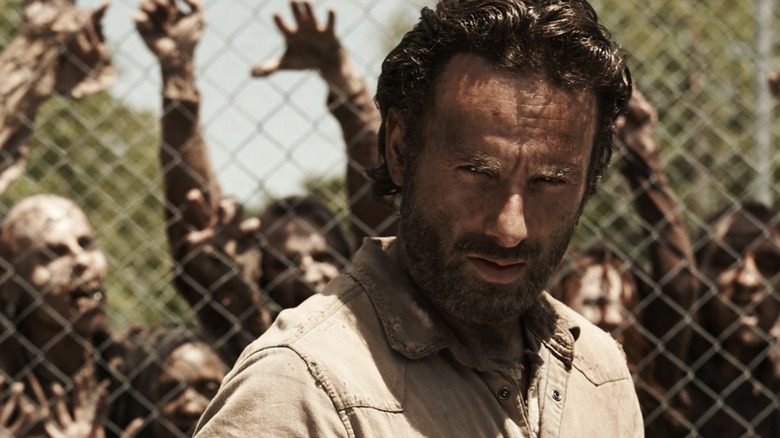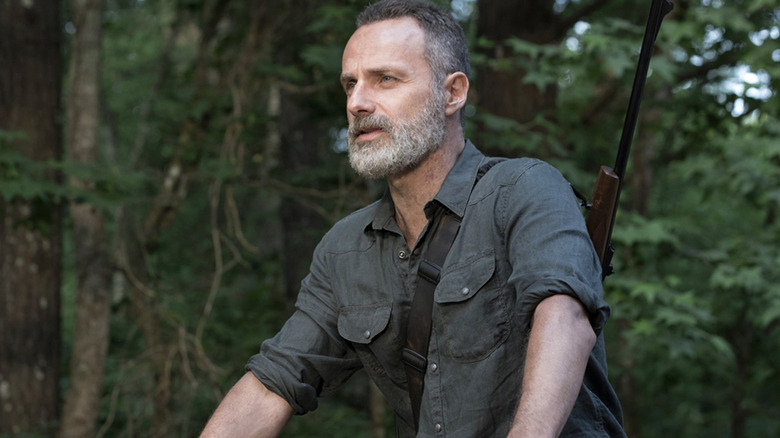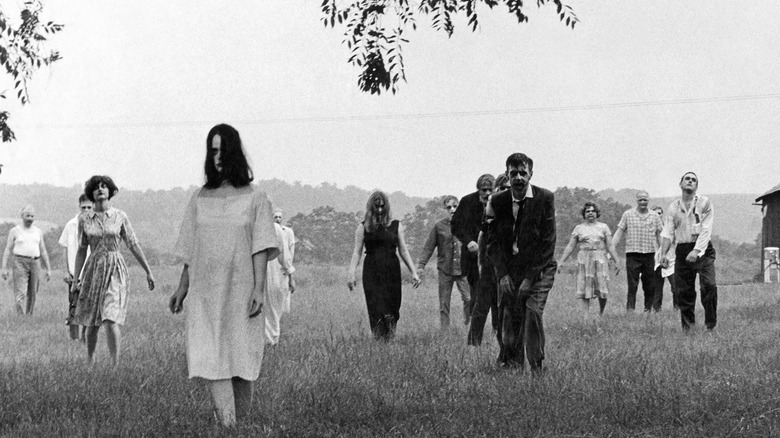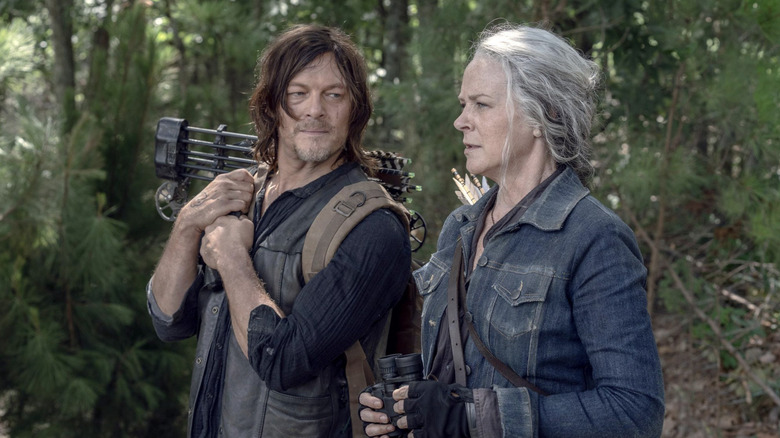Why They Never Said 'Zombie' On The Walking Dead
Although "The Walking Dead" has now come to an end after 11 seasons, the world of the show is still going strong. With several planned spinoffs involving fan-favorite characters like Rick, Michonne, Daryl, Maggie, and Negan, there's still a lot of walking ahead.
"The Walking Dead" has helped to keep zombies alive (so to speak) half a century after George Romero defined the modern zombie genre with 1968's "Night of the Living Dead." And yet, an interesting quirk of the universe created by Robert Kirkman is the surprising absence of the word "zombie." Although the term is synonymous with "The Walking Dead" at this point, it's never spoken by any of the characters. In keeping with the show's name, zombies in the show are always referred to as "walkers," among other nicknames such as "biters" and "infected."
The word's omission is intentional. Zombies have been such a relevant part of the horror genre and pop culture as a whole that zombie-centric stories now tend to go one of two routes: either embrace the zombie zeitgeist and knowingly play into the tropes of the genre, or make the characters utterly unaware of the concept of a zombie. For Robert Kirkman, the choice was simple: make it so that the world of "The Walking Dead" had never known any work of zombie fiction.
'A universe where zombie fiction doesn't exist'
Featured as a guest on Conan, Robert Kirkman explained the absence of the word "zombie," saying that he believed it would be better for the characters of "The Walking Dead" to learn how to deal with walkers through their own experiences:
"Zombie lore is very popular, and we wanted to avoid that notion of 'why isn't that character just shooting that zombie in the head 'cause they saw all those movies I saw?' We wanted to give you a sense that 'The Walking Dead' takes place in a universe where zombie fiction doesn't exist. No one inside 'The Walking Dead' has seen a Romero movie, so they can't get the rules from that. We felt like having people not use that word would separate it from that a little bit, making it a little bit clearer."
Kirkman's rule for omitting the word works exceptionally well for the series. Viewers knowledgeable in all things zombies are treated to a new kind of tension when first seeing Rick Grimes woefully unaware of walkers or their deadly potential in the show's pilot episode. Moreover, watching characters grow more adept at dealing with the infected and learning lessons the hard way about walker's weaknesses is what kept the show engaging over its 11 seasons. That's especially the case with the introduction of the Whisperers, humans who wear walker skins and move within the herds of the undead, as the main characters were unsure if walkers had evolved when they first heard them whispering to one another.
Carrying on an old tradition
Romero himself never used the word "zombie" in the dialogue for "Night of the Living Dead" (the script uses it only once, otherwise referring to the undead as "ghouls," "things" or "creatures") because the word had a distinctly different meaning back then. Originating in Haitian folklore, a zombie was a body that had been reanimated using magic and was in the thrall of a voodoo master. That's how they were depicted in the very first zombie movie: 1932's "White Zombie," which starred Bela Lugosi. As Romero explained to Entertainment Weekly:
"I never thought of my guys as zombies, when I made the first film. To me, zombies were still those boys in the Caribbean doing the wetwork for [Bela] Lugosi. I just wanted some sort of phenomenon that would be a game-changer so that I could have my human characters fail to react appropriately. [Laughs] I never called them zombies. I never thought of them as zombies. It was only when people started to write about the film and take it a bit seriously that they started to call them zombies. So I called them zombies when I made the second film 10 years later."
"Dawn of the Dead" was re-edited by Dario Argento and released under the title "Zombi" in Italy, and it spawned a series of not-at-all-official sequels under the "Zombi" branding, starting with Lucio Fulci's infamously gory 1979 film "Zombi 2." But while Romero went on to use the word "zombie" more often in scripts, it's only spoken aloud once in "Dawn of the Dead," and not at all in any of his other films. Zack Snyder's 2004 remake of "Dawn of the Dead" avoided it entirely. In fact, not saying the word "zombie" is itself part of the modern zombie tradition created by Romero.
Avoiding a 'zombie' slip up
Although "zombie" is never used by the characters themselves, Robert Kirkman still uses it in everything else involving "The Walking Dead," as he would go on to say in the same interview:
"I still call it a zombie show myself. It's kind of funny; in the scripts, it's just the dialogue we keep out of. So It's 'the zombies come here. the zombies come there.' And then suddenly, I'll slip a 'zombie' in the dialogue and go, 'Oh God! I gotta correct that!' You know, it's real haphazard behind the scenes."
"The Walking Dead" may not say the word "zombie," but it is still a zombie show through and through. From the bloody action of the series to the incredible makeup and prosthetics by the legendary Greg Nicotero, "The Walking Dead" series became a huge success by tapping into exactly what makes zombie stories so great.
Add to that a large number of factions and other settlements that the world of "The Walking Dead" introduced in the main series and spinoffs, and you have a zombie story with solid foundations. The absence of zombies from popular culture made the infected a shock and a mystery to the characters, giving the show the suspense and excitement it needed early on. By the time they figured out how to deal with walkers, there was already a much larger world and characters for the show to focus on. "The Walking Dead" may never have used the Z-word, but viewers will still remember it as one of the best zombie shows out there.



